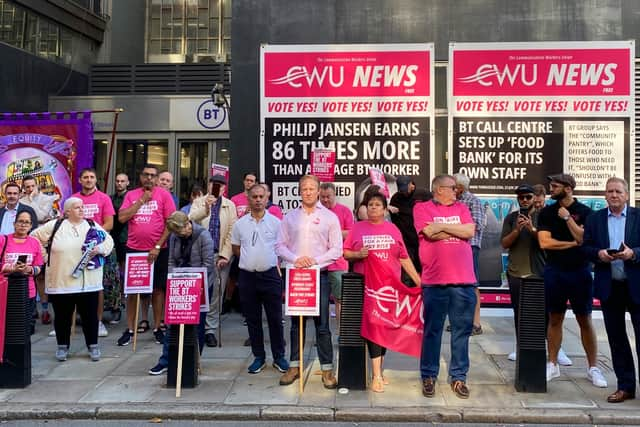BT workers strike: pay rise for staff after ‘final agreement’ reached - will the strikes end?
and live on Freeview channel 276
Telecoms giant BT has agreed to a deal with union bosses which will see workers earning £50,000 or less annually to get a pay rise of £1,500 next year.
The agreement is now being put before members to vote on and could lead to the end of strike action at the company. Under the agreement, BT said around 85% of its UK-based staff would benefit. The Communication Workers Union (CWU) said the deal would mean wage increases from anywhere between 6% to 16% depending on their pay grade.
Advertisement
Hide AdAdvertisement
Hide AdCombined with a pay rise made in April, the total increase for the least paid employees at BT will be more than 15% since this time last year. The CWU and Prospect recommended backing the deal and will ballot their members.


£1,500 pay rise
The union said from 1 April, pay is to permanently increase by £3,000, with a review taking place from 1 September 2023 to further negotiate pay, grading and structuring issues. Workers earning £50,000 or less will get a £1,500 pay rise from 1 January, as part of their salary.
BT workers, including those taking emergency calls, engineers and call centre workers, began strikes in the summer for pay increases as the cost of living crisis and inflation affected workers. The CWU said the ballot will be concluded before Christmas. If the proposed agreement is rejected, another statutory ballot will be called "in order to take further industrial action in the New Year."
Strike action was taken by around 40,000 BT workers in opposition to the company’s offer of a flat-rate pay rise of £1,500, which the union rejected and said was a real-term pay cut, as struggling workers turned towards food banks.
‘Forced BT back around the negotiating table’
Advertisement
Hide AdAdvertisement
Hide AdCWU general secretary Dave Ward said the pay increase would have not been possible without strike action: “Make no mistake, your significant sacrifice in taking strike action, making a stand against BT and objecting to their original imposed pay rise in April ultimately forced BT back around the negotiating table,” he said. Without this, there would be no further pay increase."
BT Group Chief Executive, Philip Jansen said: "This award is based on the principles we have followed throughout this difficult period. It gets help to as many of our colleagues as possible; favours our lower-paid colleagues; and gives people the security of a built-in, pensionable increase to their pay. Crucially, it has been worked on in conjunction with the CWU.
"We will now build on this collaboration. Ultimately, we all want BT Group to be successful so that we can do the best by our people and customers for years to come.”
Comment Guidelines
National World encourages reader discussion on our stories. User feedback, insights and back-and-forth exchanges add a rich layer of context to reporting. Please review our Community Guidelines before commenting.
